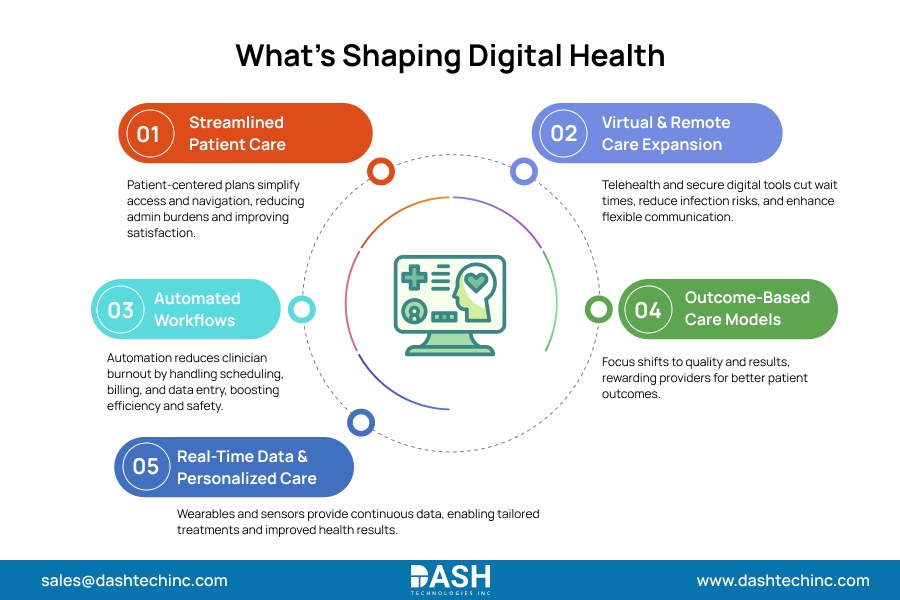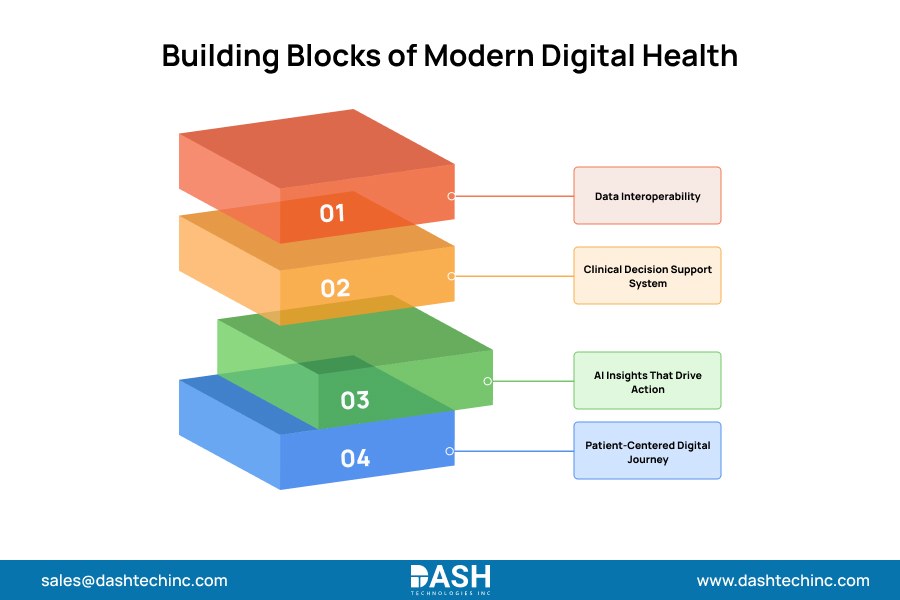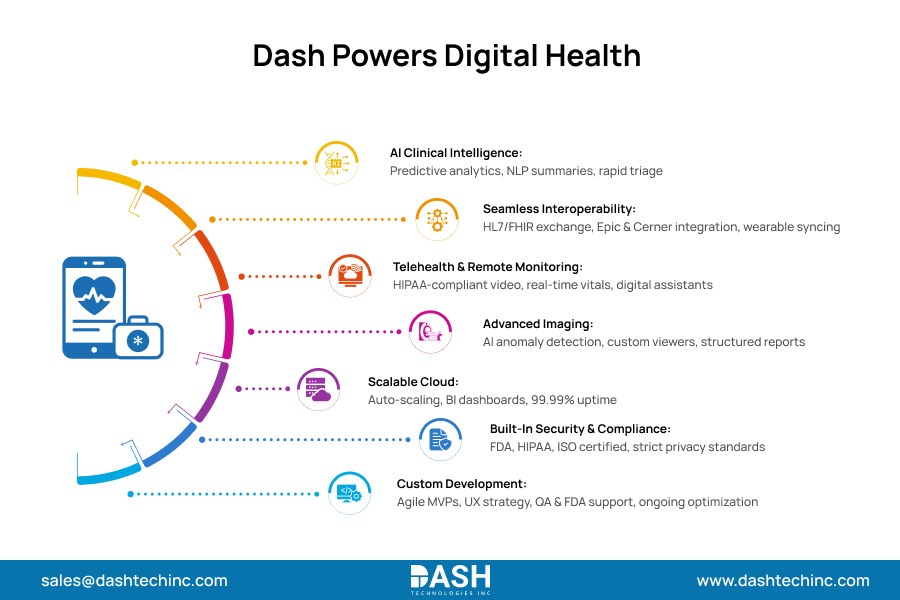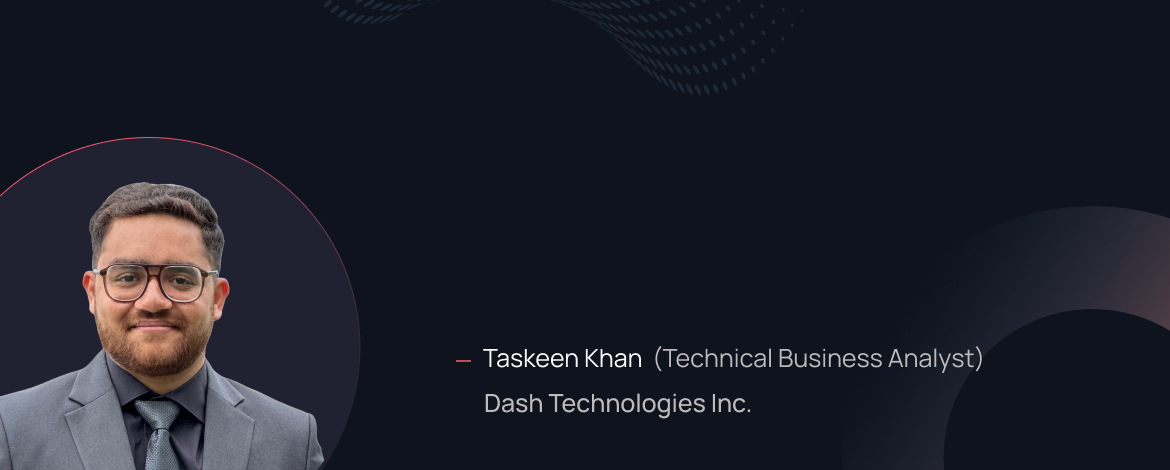Digital Health 2025: Transforming Care with Technology
In 2025, digital health is not just a component of healthcare—it defines how care is delivered. The era of patient portals and online scheduling as cutting-edge innovation is over. Today, patients, care teams, and administrators expect systems that inform, act, and guide in real time.
In this blog, we will explore how digital health has evolved, the key drivers shaping it today, and how we at Dash Technologies are powering the future of care delivery.
The Evolution of Digital Health
The first digital wave brought healthcare online appointments, lab results, and prescription refills. But real transformation means more than convenience. Today’s solutions must be smart, seamless, and scalable.
Healthcare technology has evolved due to an aging population, rising costs, and access gaps. The U.S. Affordable Care Act has led to more use of tools like electronic health records. These tools help improve care quality and patient outcomes.
According to Grand View Research, the digital health market is experiencing rapid growth. Analysts valued it at $288.55 billion in 2024 and expect it to grow by 22.2% from 2025 to 2030. This growth comes from the increased demand for telehealth, wearable tech, and digital care tools.
Shift in Digital Health: Key Drivers

1. Streamlining Patient Care Pathways
Healthcare plans are shifting toward patient-centered designs that prioritize ease of access and experience. By removing traditional barriers like provider network restrictions, these models reduce administrative burdens. This helps simplify care navigation, making the entire journey more straightforward, and improving patient satisfaction.
2. Expanding Virtual and Remote Care Solutions
Virtual-first care and telehealth reduce wait times and infection risks while addressing provider shortages. Patients and providers connect through secure messaging, video calls, and asynchronous tools like chatbots. These technologies make scheduling and communication easier and more flexible.
3. Automating Clinical and Administrative Workflows
Rising clinician burnout from documentation overload is a significant challenge that reduces time for direct patient care. Intelligent automation and robotics help with tasks like scheduling, billing, and data entry. This cuts down on labor, boosts productivity, and lets clinicians concentrate on more complex care. It also improves safety and operational efficiency.
4. Shifting Toward Outcome-Based Care
Healthcare is moving from fee-for-service to value-based, outcome-driven reimbursement models. These models reward providers for delivering quality care. Measuring clinical outcomes helps providers improve treatments and boost patient health.
5. Leveraging Real-Time Data and Personalized Care
Real-time communication and transparency boost platform usage. They allow timely data sharing and remote tracking. Plus, more sensor-based and wearable health devices generate continuous patient data. This information aids in developing personalized care plans. Providers can change treatments based on each patient’s specific needs. This enhances outcomes and lowers complications.
At Dash Technologies, we build platforms that anticipate needs, integrate workflows, and drive better decisions—proactively, not reactively.
Fundamentals of Digital Healthcare Ecosystem

The digital healthcare ecosystem links systems and devices to enhance care. It depends on secure and smooth data exchange among providers, patients, and technology. Here are some key points:
1. Data Interoperability
Data interoperability in digital healthcare enables systems to exchange structured data while maintaining consistent interpretation. HL7 FHIR allows consistent sharing of clinical data using RESTful APIs. DICOM handles imaging data and includes metadata. Together, these standards enable smooth integration across different healthcare systems.
In health information technology, OAuth 2.0 and SMART on FHIR provide secure and authorized access for external apps to electronic health records. Data transmission is protected through HTTPS encryption.
Using HL7, FHIR, and other interoperability standards, we unify siloed data from EMRs, labs, pharmacies, IoMT devices, and analytics platforms into one actionable ecosystem.
2. Clinical Decision Support System (CDSS)
CDSS uses clinical algorithms to process patient information. It provides real-time, evidence-based recommendations during treatment. The system works with EHRs to provide alerts, diagnoses, and treatment suggestions while keeping the original data intact.
Using structured inputs such as lab results, vitals, and medications ensures consistent interpretation. Its accuracy depends on up-to-date clinical knowledge and regular validation against real-world outcomes.
From oxygen drops to abnormal labs, our solutions offer real-time, patient-specific recommendations and alert-based interventions that evolve with care delivery.
3. AI Insights That Drive Action
AI applies deep learning and natural language processing to analyze structured and unstructured healthcare data, including clinical notes and imaging. It builds predictive models for patient risk and treatment response, updated regularly through automated retraining. These insights integrate with clinical systems via APIs to enable timely, data-driven decisions.
Insight without execution is incomplete. Dash embeds configurable workflows, triage automation, and clinical alerts to enable fast, safe, and meaningful action.
4. Patient-Centered Digital Journey
Patient-centric systems use real-time data from IoT devices and health apps, transmitted securely through device APIs. This data integrates into care pathways enabling therapy management, remote monitoring, and personalized patient engagement. Privacy and access are maintained through patient consent, audit trials, and compliance with HIPAA.
We build guided care pathways—empowering patients to participate actively through remote monitoring, digital nudges, and tele-engagement tools.
Dash: Your Partner in Digital Health Transformation

1. AI-Powered Clinical Intelligence
We integrate AI into clinical workflows to turn complex data into actionable insights, including:
- Predictive analytics for readmissions and complications
- NLP-based summarization of clinician notes
- Clinical decision trees for rapid triage
2. End-to-End Interoperability
Our solutions connect systems and devices smoothly with:
- Bi-directional HL7/FHIR exchange
- Deep integration with Epic, Cerner, Athenahealth
- Device and wearable syncing for longitudinal insights
3. Scalable Telehealth & Remote Monitoring
We provide secure telehealth platforms that cover everything from initial triage to post-discharge care:
- HIPAA-compliant video visits & chatbots
- Real-time vitals streaming from wearables
- Automated digital assistants for pre-visit and follow-up
4. Advanced Imaging & Diagnostics
We accelerate diagnosis with AI-enhanced imaging workflows:
- Custom DICOM viewers
- Auto-tagging of anomalies
- Structured reporting pipelines
5. Secure, Scalable Cloud Infrastructure
Built on AWS, Azure, or on-premises, our cloud infrastructure offers:
- Auto-scaling, failover, and redundancy
- BI dashboards and admin insights
- Global accessibility and 99.99% uptime
6. Security & Compliance: Built In, Not Bolted On
Every component meets strict privacy and regulatory standards, including:
Regulatory Certifications:
- FDA Class I/II readiness
- IEC 62304 (medical device software)
- ISO 13485, ISO 9001
- 21 CFR Part 11 (electronic records)
- CE Marking (EU compliance)
Privacy & Cybersecurity Standards:
- HIPAA & HITRUST
- SOC 2 Type II
- HL7 and FHIR standards
- DoD JITC and ONC compliance-aligned readiness
7. Custom Product Development That Grows with You
Whether you’re launching a pilot or scaling nationally, our team of developers, designers, and healthcare SMEs will meet you where you are.
We offer:
- Product discovery & UX strategy
- Agile sprints and roadmap planning
- MVPs with scalable architecture
- QA automation & FDA submission readiness
- Go-live support & post-deployment optimization
Looking Ahead: The Future of Digital Health at DASH
We’re building new tools that will shape tomorrow’s healthcare:
- Voice-enabled charting & clinical NLP
- Wearable-integrated care coordination
- AI-generated discharge & handoff summaries
- Digital therapeutics for behavioral health
- CMS-backed reimbursement for remote & virtual care
At Dash Technologies, we believe innovation should solve real-world healthcare challenges—without adding complexity. That’s why we design solutions that are purpose-built, clinically informed, and patient-focused. Our goal is to support better care, every step of the way.
Want to explore how we can help your organization build smarter healthcare solutions? Contact us today to start the conversation.
About Dash

Dash Technologies Inc.
We’re technology experts with a passion for bringing concepts to life. By leveraging a unique, consultative process and an agile development approach, we translate business challenges into technology solutions Get in touch.








